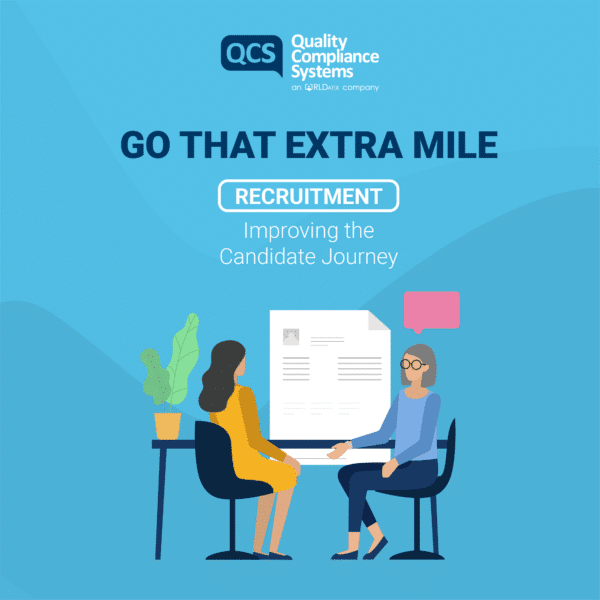What do you do as a provider that is over an above expectations? In the first part of this series we look at the everyday tasks Registered Managers should strive to do and how they can be achieved. Download ‘Go that extra mile – Recruitment’ below.
DOWNLOAD NOW
Alternatively, read it here:
Going that extra mile is about what you can do as a provider that is over and above expectations. In this series we are going to look at some of the everyday tasks that you as a Registered Manager should strive to do and useful tips on how to achieve them.
Here at QCS we understand that arranging interviews and interview sessions can be time consuming especially when you block out a whole day to do them and 90% of candidates don’t even turn up.
However, this should not affect how you approach interviews. With so many vacancies in social care, candidates can be as choosy as they want. But what we should not underestimate is just how much impact the interview experience has in deciding whether a candidate will accept or reject a role with you.
But there are some useful things you can do to showcase your organisation, service users and staff to give any potential candidate a long lasting and positive impression. So, we are urging all of you to go that extra mile.
It is important that when arranging interviews several factors are addressed to ensure that your workplace is so inviting that candidates will not only turn up, but more importantly choose you over others.
Location Location Location
- When arranging interviews do not leave the location to the last minute
- Organise an appropriate room, free from distraction, that can accommodate your plans
- Avoid interviews on couches or in dining rooms as it can be distracting for both the candidate and the panel
- Rooms should be checked, and any rubbish cleared before the interview starts
- Ensure facilities are suitable such as toilets, drinks and any equipment needed
Time is an asset on both sides of the table
Your day is so busy with the requirements of the job so use it wisely when planning your recruitment process.
- You will know from experience how long your average interview takes depending on the position. So, allow enough time for it and build in additional time for housekeeping and possible panel discussion for candidates
- Ensure any application forms are completed way before the interview takes place, this saves time and avoids candidates rushing to complete it minutes before the interview
- If the candidate is on time, then the interview process should be too
- Give the candidates time to relax in the interview. Do not rush them or any questions you need to ask. More importantly allow candidates time to answer questions
- Remember your time is paid for. Candidate’s attend for free so be grateful and considerate of this
Welcome
Planning how your candidates are treated and welcomed from the start to the end of the interview process should be a key consideration. Candidates will notice these things and anything negative can reflect on any decision they may make later.
- You can never underestimate the power of a positive welcome
- Make sure your reception team have a list of candidates, so they know who to expect and when
- Rehearse the initial greeting. Smile, ‘Hello. Welcome to… Thank you so much for coming today. My name is…. I will let [insert name] know you are here.’ Offer a seat, and if appropriate a drink
- Make sure they understand any requirements or actions they need to take on arrival such as copying documents or certificates for verification
- Is your reception area neat and tidy?
The Grand Tour
A pre-interview walk around can really help your process. For example: If the candidate is put off at this stage, then it saves interview time if they withdraw at this point rather than later. On the other hand, it could spur them on to do well in the interview if they see a service operating at its best.
- Have you completed a walk around prior to the interview starting to make sure your service looks its best?
- Preallocate someone to give the tour – someone friendly and engaging
- Think about saving some time. Combine a tour and meet and greet. It allows the candidate to see friendly staff in a well-led service
- Provide an opportunity for candidates to meet and see happy service users – hopefully this will leave a good impression
- A pre-interview walk around also helps candidates relax – staff can assess interaction and it can give candidates valuable insight and better understanding of your care facility
Drinks Anyone?
- On arrival you should offer a candidate a warm welcome and a drink. If the candidate is given a tour straightway, consider if they want to be carrying a drink with them or is it best to finish the drink beforehand?
- Provide fresh water and a clean glass for each candidate during the interview room to make use of as and when needed. Encourage them to use it too
Body Language and Setting
Great body language – basically communicating without speaking – can make a candidate feel at ease and feel that you are really listening to them.
- Consider how you want the room to be laid out for the interview. Do you want formal (table and chairs) or informal (comfy sofas) layout?
- Have good eye contact with the candidate, explain you will take notes, so they are aware – maintaining eye contact and scribbling notes is never easy
- Listen to what they have to say
- Maintain a good posture, slouching can make it look like you are bored
- Do not keep moving about, click your pen or tap your feet and be aware of repeatedly touching or scratching your face, nose, head, or ears. The candidate may find it off putting
- Gesture and use your hands to help clarify points in a calm manner
- Smile, laugh and nod whenever appropriate
Be Organised
Success depends on preparation, and this is so important with interviews.
- Have enough CVs and interview documentation for all the panel. Sharing isn’t a good look
- Consider having a written plan in your recruitment file. A to do list of actions for each post, so you and the team know what is needed and when
- If you are expecting candidates to do presentations, ensure all equipment is tested and set up in advance
- Even though your paperwork states if the candidate has any additional requirements make sure these are fulfilled. Ask them if they have everything they need, this shows you are considerate and inclusive
Clear Agenda
This may sound silly but as we have said earlier. Have a plan of action and share it with the team – you never know if you will be called away and things should still operate smoothly without you.
- Remember every process has a beginning, a middle and an end
- Explain how your process is going to work as that way you will not spring any surprises on the candidates
- Decide ahead of the interviews what questions are being asked and who will ask them
Company Panel and Role
A great opportunity to show how great your facility is and what you do.
- Provide the interview panel with name badges or place cards – include their roles too
- Talk about your company and why it is a great place to work
- Clarify the role the candidate is interviewing for and the type of work they will be involved in
- Emphasise shift patterns and working expectations
- Give the candidate an opportunity to ask any questions
- Provide a service user guide or information pack you can give the candidate to take away. This can be highly effective if they are interviewing elsewhere, as they have your pack at their fingertips, and this might well reinforce why they should come and work with you
Question Time
Plan questions beforehand and do your best to ensure they are fair, appropriate and pitched at the right level for the role. Please give the candidate enough time to answer them.
- Remember the questions should start easy to relax the candidate
- Build up to harder and scenario-based questions
- End with questions designed to relax such as housekeeping
- Do not leave the candidate sitting in silence if they do not answer straightaway but give them a little time before speaking
- If they can’t or only give a partial answer probe a little bit more or try rephrasing the question
Make notes but do not score a candidate… yet
Throughout the interview, actively listen and take accurate, concise notes.
- Bullet point your notes and capture key comments such as regulations, legislation as this can help you be really concise and give more time to have eye contact with the candidate
- Make sure your notes are not in view – some candidates have fantastic eyesight and can find this distracting
- Scoring during interview can distract and reduce candidate confidence. Use the time more effectively to engage with the candidate
- Scoring can also distract you. Allocate time post interview to reflect on all the candidates performance and score them appropriately
Time to talk and next steps
It’s really important to give the candidate time to ask you any questions and for you to outline the next steps. Candidates should leave your care facility knowing they had a great experience, wanting to work for you and knowing exactly what the next steps will be.
- Offer the candidate opportunity to question the panel
- Ask how they found the interview process – you can use this to reflect on your process
- Ask if they are clear on the role and expectations, if not give more details
- Thank them for turning up and advise them of the next steps
- Follow them out, wish them a good day, say goodbye, and let them know if they have any additional questions to get in touch with a named person and give a phone number



